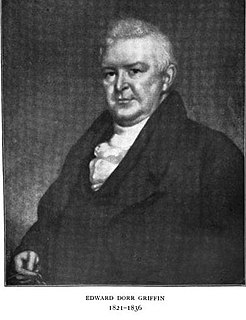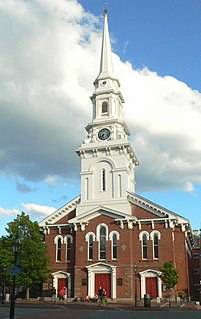Fred Hoskins (8 January 1906 – 20 April 1966) was an American clergyman who served as first co-president of United Church of Christ with James Wagner from 1957 to 1961.

The United States of America (USA), commonly known as the United States or America, is a country composed of 50 states, a federal district, five major self-governing territories, and various possessions. At 3.8 million square miles, the United States is the world's third or fourth largest country by total area and is slightly smaller than the entire continent of Europe's 3.9 million square miles. With a population of over 327 million people, the U.S. is the third most populous country. The capital is Washington, D.C., and the largest city by population is New York City. Forty-eight states and the capital's federal district are contiguous in North America between Canada and Mexico. The State of Alaska is in the northwest corner of North America, bordered by Canada to the east and across the Bering Strait from Russia to the west. The State of Hawaii is an archipelago in the mid-Pacific Ocean. The U.S. territories are scattered about the Pacific Ocean and the Caribbean Sea, stretching across nine official time zones. The extremely diverse geography, climate, and wildlife of the United States make it one of the world's 17 megadiverse countries.

The United Church of Christ (UCC) is a mainline Protestant Christian denomination based in the United States, with historical confessional roots in the Congregational, Reformed, and Lutheran traditions, and with approximately 4,956 churches and 853,778 members. The United Church of Christ is a historical continuation of the General Council of Congregational Christian churches founded under the influence of New England Pilgrims and Puritans. Moreover, it also subsumed the third largest Reformed group in the country, the German Reformed. The Evangelical and Reformed Church and the General Council of the Congregational Christian Churches united in 1957 to form the UCC. These two denominations, which were themselves the result of earlier unions, had their roots in Congregational, Lutheran, Evangelical, and Reformed denominations. At the end of 2014, the UCC's 5,116 congregations claimed 979,239 members, primarily in the U.S. In 2015, Pew Research estimated that 0.4 percent, or 1 million adult adherents, of the U.S. population self-identify with the United Church of Christ.
James Elvin Wagner (1873–1969) was a U.S. clergyman. The last president of the Evangelical and Reformed Church, Wagner served as the first co-president of the United Church of Christ from 1957 until 1961. His Congregational Christian counterpart was the Rev. Fred Hoskins.









